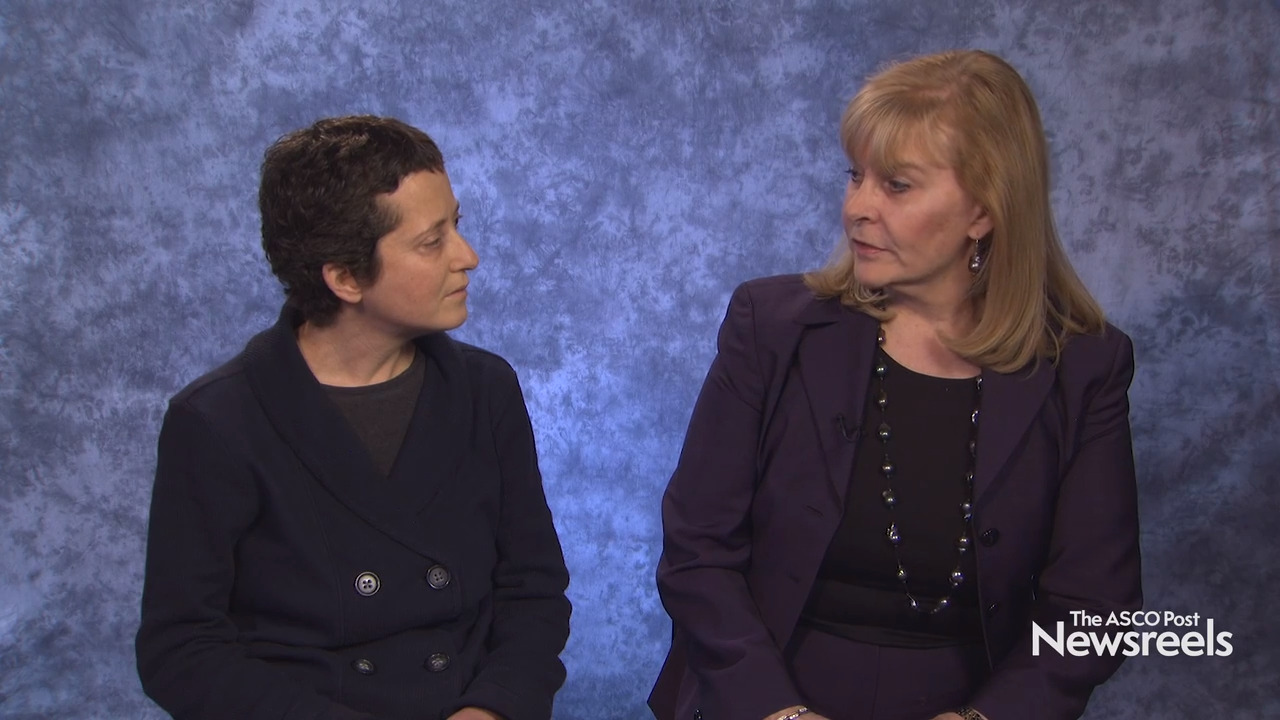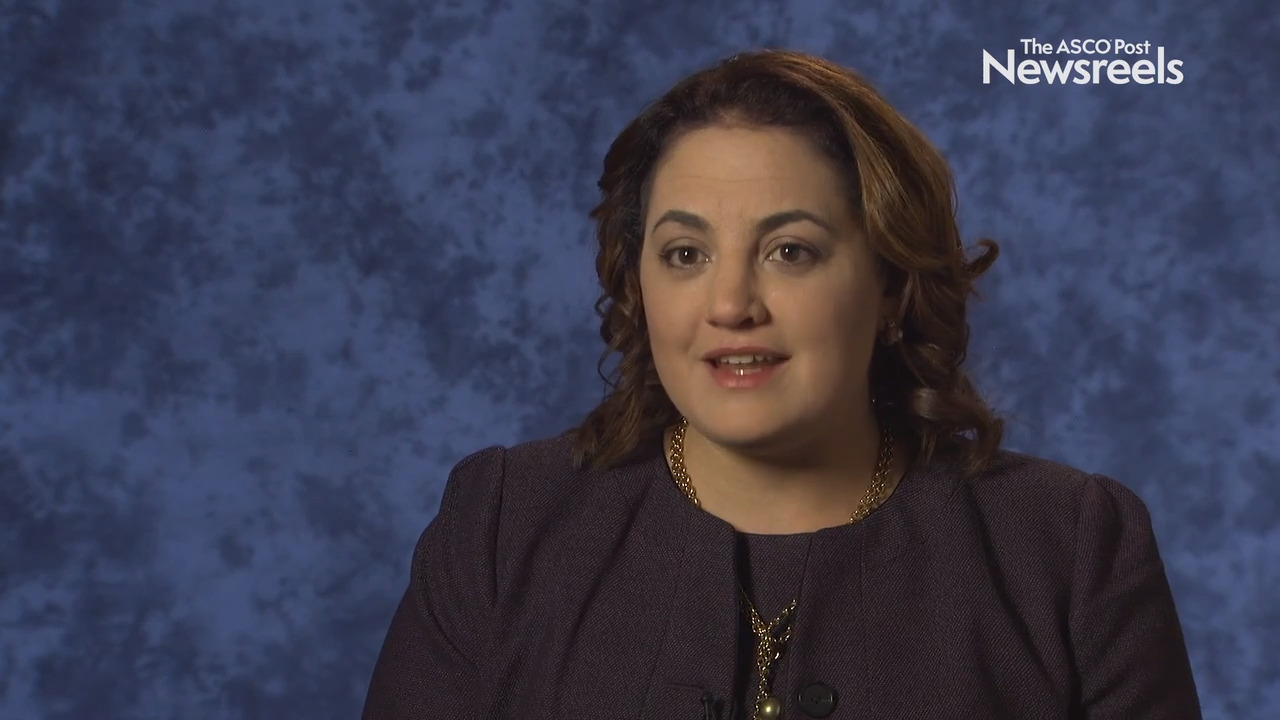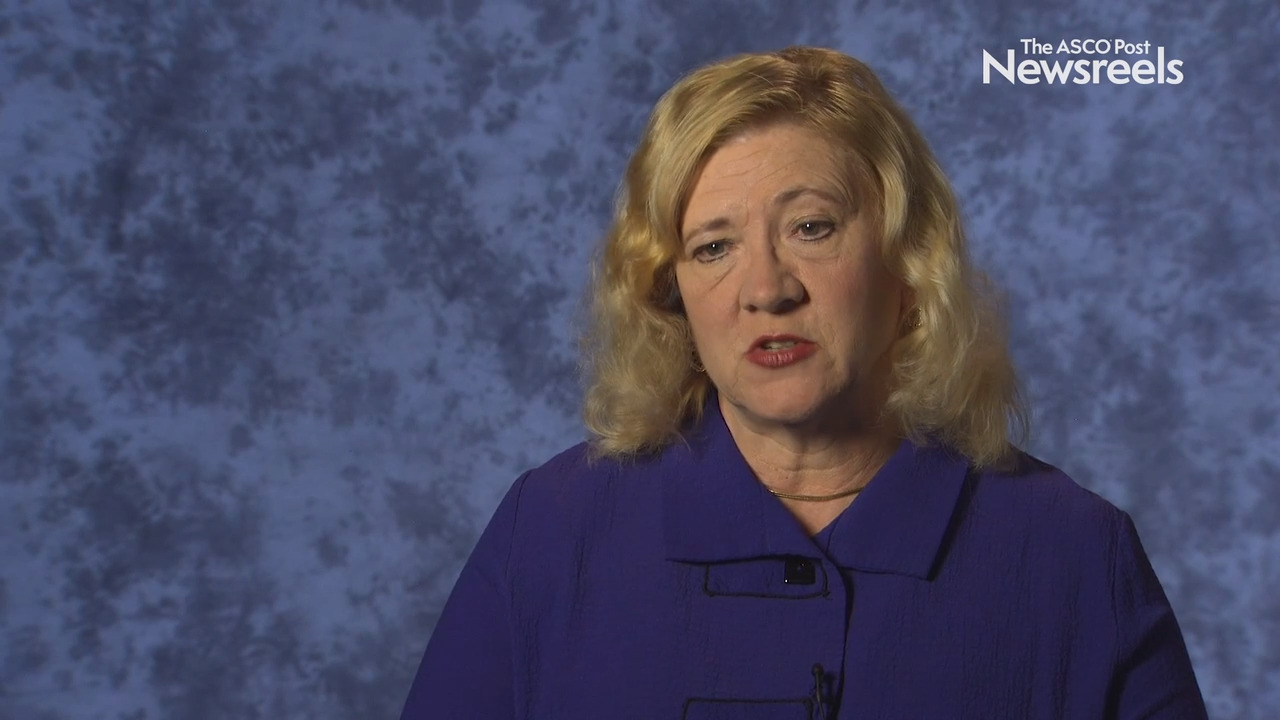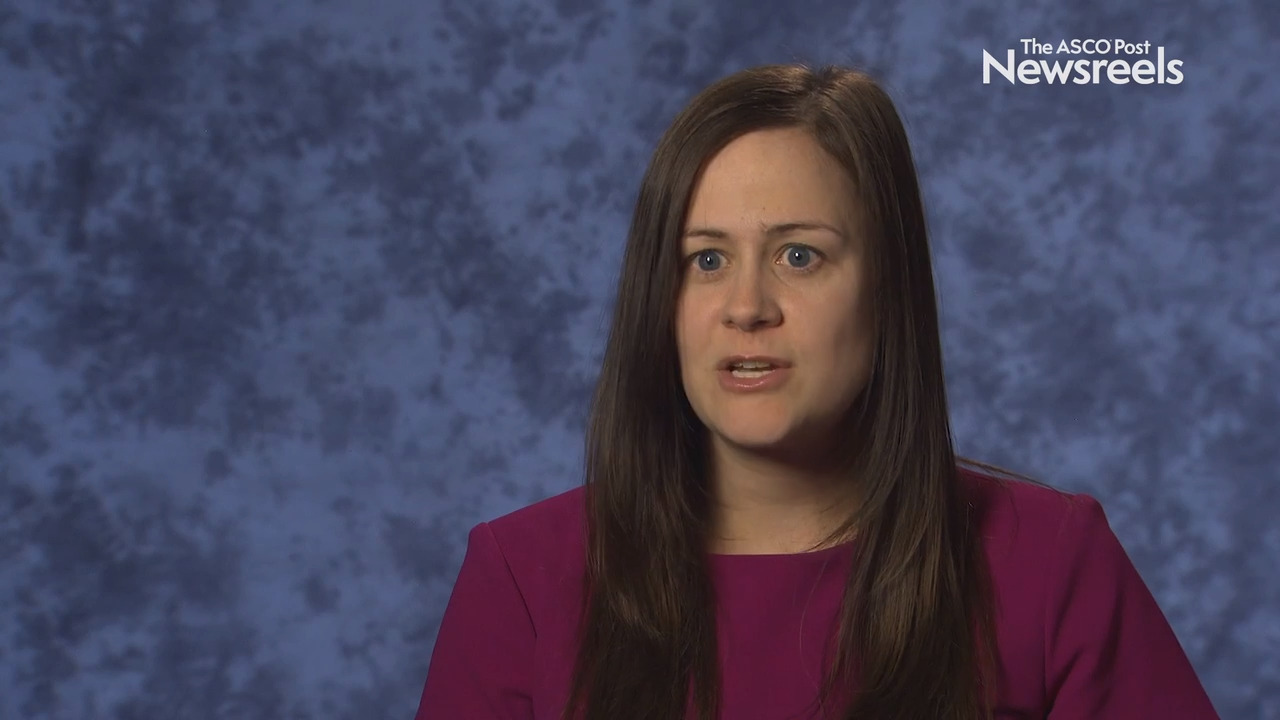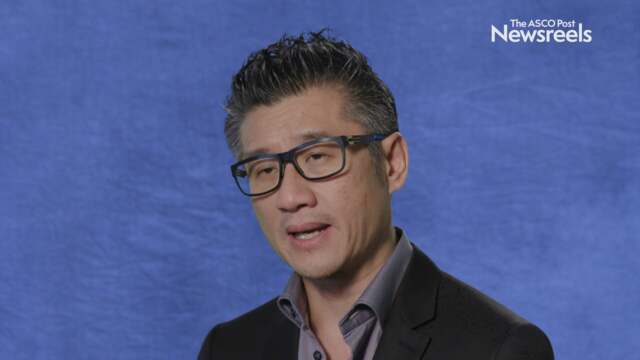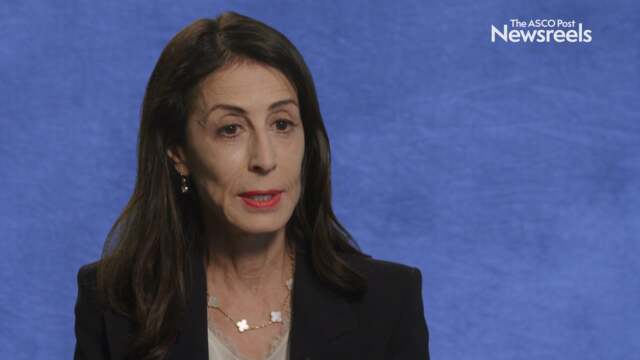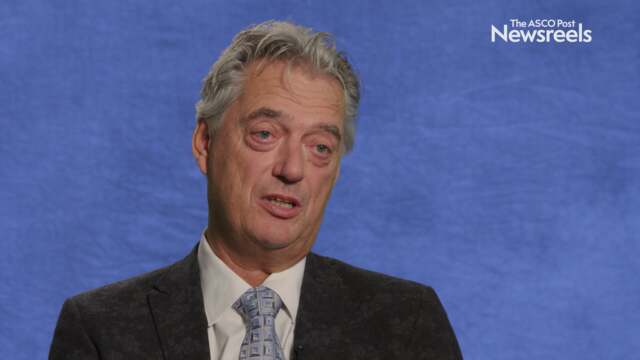Julie Vose, MD, MBA, and Merav Bar, MD, on CAR T-Cell Therapy: Late Effects of CD19-Targeted Treatment
Julie Vose, MD, MBA, of the University of Nebraska Medical Center, and Merav Bar, MD, of the Fred Hutchinson Cancer Research Center, discuss study findings on the long-term effects in people with relapsed or refractory non-Hodgkin lymphoma and chronic lymphocytic leukemia who received CD19-targeted CAR T-cell infusions, survived more than a year, and had at least 1 year of follow-up data after their first treatment (Abstract 223).
ASH 2018: Update of ZUMA-1: Axicabtagene Ciloleucel in DLBCL
A follow-up analysis of patients enrolled in the multicenter ZUMA-1 trial for diffuse large B-cell lymphoma (DLBCL) showed axicabtagene ciloleucel can induce durable responses, yield a median overall survival of more than 2 years, and has a manageable long-term safety profile. Axicabtagene...
ASH 2018: Hematopoietic Stem Cell Transplant After CD19 CAR T-Cell Therapy in ALL
In a new study presented by Summers et al at the 2018 American Society of Hematology (ASH) Annual Meeting & Exposition (Abstract 967), patients with acute lymphoblastic leukemia (ALL) who received a first stem cell transplant after CD19 chimeric antigen receptor (CAR) T-cell therapy were less...
ASH 2018: Checkpoint Inhibitors Plus CAR T-Cell Therapy in Relapsed ALL
CD19-directed chimeric antigen receptor (CAR) T-cell therapy has been shown to be effective in patients with relapsed B-cell acute lymphocytic leukemia (B-ALL). However, in some patients, the antitumor effects of CAR T-cell treatment are short-lived, which may, in part, be caused by a reaction of...
ASH 2018: Concurrent Ibrutinib May Improve Outcomes, Reduce Toxicity of CAR T-Cell Therapy in Relapsed or Refractory CLL
For patients with difficult-to-treat chronic lymphocytic leukemia (CLL), continuing to take ibrutinib (Imbruvica) before, during, and after receiving chimeric antigen receptor (CAR) T-cell therapy may be associated with less severe adverse effects and better responses compared with outcomes for a...
ASH 2018: ELIANA Trial: Tisagenlecleucel in Pediatric and Young Adult Patients With ALL
A single infusion of tisagenlecleucel (Kymriah) in pediatric and young adult patients with relapsed or treatment-resistant acute lymphocytic leukemia (ALL) continues to be highly effective in most patients, without the need for additional therapies. This latest analysis of the ELIANA trial results...
ASH 2018: Azacitidine With Nivolumab Plus Ipilimumab vs Azacitidine Plus Nivolumab in Relapsed or Refractory AML
A triplet therapy combining two immune checkpoint inhibitors with the standard of care azacitidine has shown promising results for treatment of relapsed or refractory acute myeloid leukemia (AML), according to the findings of a phase II study conducted at The University of Texas...
ASH 2018: Updated Analysis of JULIET Trial: Tisagenlecleucel in Relapsed or Refractory DLBCL
In an update to the global JULIET clinical trial, the chimeric antigen receptor (CAR) T-cell therapy tisagenlecleucel (Kymriah) led to long-lasting remissions in patients with relapsed or refractory diffuse large B-cell lymphoma (DLBCL). The most recent results from the trial were presented by...
Cardiovascular Toxicities Associated With Immune Checkpoint Inhibitor Treatment
In a pharmacovigilance study reported in The Lancet Oncology, Salem et al found that immune checkpoint inhibitors can cause “severe and disabling inflammatory cardiovascular immune-related adverse events” that need to be considered in patient care and clinical trial design. Study...
Addition of Interleukin-2 to Dinutuximab Beta in High-Risk Neuroblastoma
In an international phase III trial (HR-NBL1/SIOPEN) reported in The Lancet Oncology, Ladenstein et al found that the addition of interleukin (IL)-2 to dinutuximab beta did not improve event-free survival in children and young people with high-risk neuroblastoma. Study Details The current report...
The Abscopal Effect: A Reemerging Field of Interest
For the past 50 years or more, oncologists have designed their treatment plans around the three pillars: surgery, chemotherapy, and radiation. Now, with a series of recent successes, immunotherapy is rapidly reemerging as the fourth pillar in the oncologic armamentarium. Despite major advancements...
ASCO, SITC Release Recommendations for Reporting of Immuno-Oncology Clinical Trials
ASCO and the Society for Immunotherapy of Cancer (SITC) have released a joint statement with 12 clinical trial reporting recommendations that address the unique efficacy, toxicity, and combination/sequencing aspects of immuno-oncology (IO) treatments. These recommendations, jointly published in the ...
Azacitidine Plus Nivolumab in Relapsed or Refractory AML
A combination of the chemotherapy drug azacitidine with the immune checkpoint inhibitor nivolumab (Opdivo) demonstrated an encouraging response rate and overall survival in patients with relapsed or refractory acute myeloid leukemia (AML), according to findings from a phase II study published...
Allison S. Betof Warner, MD, PhD, on Managing Immune-Related Adverse Events: Incorporating Guidelines
Allison S. Betof Warner, MD, PhD, of Memorial Sloan Kettering Cancer Center, discusses the rationale for immunotherapy and combination treatments, identifying the agents that lead to toxicities, and ways to manage them.
Betty R. Ferrell, PhD, on Quality of Life in the Era of Immunotherapy
Betty R. Ferrell, PhD, of City of Hope, discusses the many advances in immunotherapy and the drugs’ effect on patients’ quality of life, including psychological well-being.
Elizabeth Jane Cathcart-Rake, MD, on Immunotherapy-Related Toxicities: More Common Than Originally Reported?
Elizabeth Jane Cathcart-Rake, MD, of the Mayo Clinic, discusses the frequency of side effects from immunotherapy, the need to closely monitor those receiving this treatment, and the role of clinicians in educating their patients on toxicities (Abstract 184).
Neoadjuvant Therapy With Reduced-Dose Immunotherapy for Stage III Melanoma
In patients with stage III melanoma, a reduced-dose neoadjuvant immunotherapy combination was well tolerated and led to high pathologic response rates, in the phase II OpACIN-neo trial presented at the European Society for Medical Oncology (ESMO) 2018 Congress.1 “Neoadjuvant ipilimumab (Yervoy) at...
Immunotherapy and Tyrosine Kinase Inhibitor Combination in Advanced Renal Cell Carcinoma
In the JAVELIN Renal 101 phase III study, the combination of the immune checkpoint inhibitor avelumab (Bavencio), a programmed death ligand-1 (PD-L1) blocking antibody, plus the tyrosine kinase inhibitor axitinib (Inlyta) significantly improved progression-free survival in previously untreated...
Pembrolizumab Improves Survival in Advanced Head and Neck Cancer
An overall survival advantage has now been shown for first-line immunotherapy in recurrent or metastatic head and neck cancer, researchers reported at the European Society for Medical Oncology (ESMO) 2018 Congress.1 In the phase III KEYNOTE-048 trial, treatment with the anti–programmed cell death...
First-Line Immunotherapy Shows Benefit in Metastatic Colorectal Cancer Subset
In previously untreated patients with metastatic colorectal cancer and tumors demonstrating microsatellite instability–high (MSI-high) or mismatch repair deficiency (dMMR), immunotherapy with nivolumab (Opdivo) and low-dose ipilimumab (Yervoy) produced a durable clinical benefit in the...
Outcomes in Melanoma With Active Brain Metastases After Treatment With Pembrolizumab
As reported in the Journal of Clinical Oncology by Kluger et al, pembrolizumab (Keytruda) showed activity in brain metastases in patients with melanoma enrolled in a phase II study. The study included 23 patients with melanoma with one or more asymptomatic untreated 5- to 20-mm brain metastasis...
Corticosteroids and Immunotherapy: Guilty or Guilt By Association?
FIRST-LINE TREATMENT options for advanced non–small cell lung cancer (NSCLC) include single- agent immunotherapy for patients with a programmed cell death ligand 1 (PD-L1) tumor proportion score of at least 50% or in combination with chemotherapy in unselected patients.1-3 Single immunotherapy is...
Corticosteroid Use at Start of PD-1/PD-L1 Inhibitor Therapy Affects Outcomes in NSCLC
IN A STUDY reported in the Journal of Clinical Oncology, Kathryn C. Arbour, MD, of Memorial Sloan Kettering Cancer Center, and colleagues found that baseline treatment with corticosteroids was associated with poorer efficacy of programmed cell death protein 1/programmed cell death ligand 1...
Atezolizumab Plus Chemotherapy Improves Outcomes in Small Cell Lung Cancer
ATEZOLIZUMAB (TECENTRIQ), an anti–program cell death ligand 1 (PD-L1) antibody, combined with carboplatin/ etoposide as first-line treatment for extensive-stage small-cell lung cancer (SCLC) improved overall and progression-free survival and may represent a new standard of care, according to...
Expert Point of View: Shahrokh Shariat, MD
“BACILLUS CALMETTE-GUÉRIN (BCG) failures are quite common, with a 66% recurrence rate at 5 years, and about 25% of patients will have disease progression,” explained formal discussant Shahrokh Shariat, MD, Chair of the Department of Urology at Medical University, Vienna, and Adjunct Professor at...
Pembrolizumab Shows Antitumor Activity in Non–Muscle Invasive Bladder Cancer
THE ANTI–PROGRAMMED cell death protein 1 (anti–PD-1) checkpoint inhibitor pembrolizumab (Keytruda) was found to have antitumor activity in patients with high-risk non–muscle invasive bladder cancer who were nonresponsive to bacillus Calmette-Guérin (BCG), according to the preliminary results of the ...
Expert Point of View: Giuseppe Curigliano, MD, PhD
“IMPASSION130 IS a positive study of immuno-oncology that brings breast cancer into the immunotherapy era,” said the invited discussant of the trial, Giuseppe Curigliano, MD, PhD, Associate Professor of Oncology at the University of Milan and Chair of Early Drug Development at the Institute of...
Immunotherapy Improves Survival in a Subset of Patients With Metastatic Triple-Negative Breast Cancer
IMMUNOTHERAPY APPEARS to be the new upfront standard of care for patients with metastatic triple-negative breast cancer, based on a late-breaking presentation at the European Society for Medical Oncology (ESMO) 2018 Congress1 and simultaneously published in The New England Journal of Medicine.2 In ...
Combination of Macrophage Immune Checkpoint Inhibitor and Rituximab in Non-Hodgkin Lymphoma
In a phase Ib study reported in The New England Journal of Medicine, Advani et al found that the combination of rituximab (Rituxan) and the CD47-blocking monoclonal antibody Hu5F9-G4 (or 5F9), a macrophage immune checkpoint inhibitor, was active in patients with non-Hodgkin lymphoma. CD47, which is ...
PURE-01 Trial: Neoadjuvant Immunotherapy in Muscle-Invasive Bladder Carcinoma
In the Italian phase II PURE-01 trial reported in the Journal of Clinical Oncology, Necchi et al found that neoadjuvant pembrolizumab (Keytruda) before radical cystectomy in muscle-invasive bladder carcinoma produced complete pathologic response (pT0) in 42% of patients, with pT0 being more common...
Actively Recruiting Clinical Trials Focused on Immunotherapies for Lung Cancer
The information contained in this Clinical Trials Resource Guide includes actively recruiting clinical studies focused on immunotherapies in lung cancer. These trials are studying combination therapies, radiotherapy plus immunotherapy, cancer vaccines, identifying biomarkers to immunotherapy...
COMBI-AD Trial: Longer-Term Follow-up of Adjuvant Dabrafenib Plus Trametinib in Resected BRAF V600–Mutant Stage III Melanoma
As reported by Hauschild et al in the Journal of Clinical Oncology, longer-term follow-up of the phase III COMBI-AD trial has confirmed improved relapse-free survival with adjuvant dabrafenib (Tafinlar) plus trametinib (Mekinist) vs placebo in resected BRAF V600–mutant stage III melanoma. In...
ESMO 2018: CheckMate-142 Reports New Data on First-Line Nivolumab Plus Low-Dose Ipilimumab in MSI-H/dMMR Metastatic Colorectal Cancer
The combination of nivolumab (Opdivo) and low-dose ipilimumab (Yervoy) could become a new first-line treatment in patients with microsatellite instability–high (MSI-H), mismatch repair–deficient (dMMR) metastatic colorectal cancer, following results from the CheckMate-142 trial reported ...
ESMO 2018: Small Study of Preoperative Nivolumab Plus Ipilimumab in dMMR Colon Cancer
Neoadjuvant treatment with a combination of the immune checkpoint inhibitors nivolumab (Opdivo) and ipilimumab (Yervoy) achieved major pathological responses in mismatch repair–deficient (dMMR) early-stage colon cancers, according to results reported by Chalabi et al at the European...
ESMO 2018: CheckMate 067: 4-Year Follow-up of Nivolumab Plus Ipilimumab in Advanced Melanoma
As reported in The Lancet Oncology and at the European Society for Medical Oncology 2018 Congress by Hodi et al, the 4-year follow-up of the phase III CheckMate 067 trial has shown a continued overall survival benefit with first-line nivolumab (Opdivo) plus ipilimumab (Yervoy) or nivolumab alone vs ...
David Raben, MD, on NSCLC: Results From the PACIFIC Trial
David Raben, MD, of the University of Colorado, discusses overall survival with durvalumab vs placebo after chemoradiotherapy in stage III non–small cell lung cancer (Abstract LBA10).
Caroline Robert, MD, PhD, on Immunotherapy Toxicities: Expert Perspective
Caroline Robert, MD, PhD, of Gustave Roussy Cancer Centre, discusses managing toxicities of immunotherapy, including neurotoxicity, and treating beyond acute adverse events.
Caroline Robert, MD, PhD, on Advanced Melanoma: Research Highlights
Caroline Robert, MD, PhD, of Gustave Roussy Cancer Centre, discusses two high-impact studies in stage III melanoma treatment: an update of the COMBI-AD trial examining dabrafenib and trametinib; and neoadjuvant ipilimumab and nivolumab therapy.
Analysis of Prognostic Value of Postinduction PET Response After First-Line Immunochemotherapy for Follicular Lymphoma
In an analysis of the phase III GALLIUM trial reported in The Lancet Oncology, Trotman et al found that end-of-induction fluorodeoxyglucose positron-emission tomography (PET) after first-line immunochemotherapy appeared to better predict treatment outcomes than contrast-enhanced computed tomography ...
ESMO 2018: First-Line Immunotherapy for Recurrent or Metastatic Head and Neck Squamous Cell Carcinoma
Pembrolizumab (Keytruda) improved survival in patients with head and neck cancer that has recurred or metastasized in the KEYNOTE-048 trial, according to late-breaking results from the study reported by Burtness et al at the European Society for Medical Oncology (ESMO) 2018 Congress (Abstract...
Tony Mok, MD, on NSCLC: Targeted Treatment Update
Tony Mok, MD, of the Chinese University of Hong Kong, discusses two important studies in non–small cell lung cancer: FLAURA, which looked at the first-line activity of osimertinib and the mechanisms of resistance; and ALESIA, which examined crizotinib dosing.
Suresh S. Ramalingam, MD, on Lung Cancer: Research Highlights
Suresh S. Ramalingam, MD, of the Emory University School of Medicine, summarizes the top-line lung cancer results reported at this year’s ESMO Congress, including the role of targeted treatment for early stage NSCLC, combining immunotherapy for surgically resectable disease, and immunotherapy for small–cell lung cancer as well as unresectable NSCLC.
Laurence Albiges, MD, PhD, on RCC: Challenging Established Front-Line Treatment
Laurence Albiges, MD, PhD, of Gustave Roussy, discusses data from the global, phase III JAVELIN trial that compared axitinib plus avelumab vs sunitinib, which could lead to a new standard of care in renal cell carcinoma (Abstract LBA6_PR).
ESMO 2018: JAVELIN Renal 101: Avelumab Plus Axitinib in Previously Untreated Renal Cell Carcinoma
A combination of the immune checkpoint blocker avelumab (Bavencio) plus the tyrosine kinase inhibitor axitinib (Inlyta) improved progression-free survival (PFS) in previously untreated patients with advanced renal cell carcinoma (RCC) in the phase III JAVELIN Renal 101 study, according to results...
Three Scientists Recognized With Awards for Distinguished Research in Tumor Immunology
The Cancer Research Institute honored three scientists for their work in immunology and cancer immunotherapy at the group’s annual gala held recently in New York. Padmanee Sharma, MD, PhD, Professor of Genitourinary Medical Oncology and Immunology at The University of Texas MD Anderson Cancer...
Assay Uses Big Data to Predict Responses to Immunotherapy
In the age of big data, cancer researchers are discovering new ways to monitor the effectiveness of immunotherapy treatments. Researchers at the Johns Hopkins Bloomberg~Kimmel Institute for Cancer Immunotherapy developed a new way to use bioinformatics as a gathering tool to determine how a...
Lisa A. Carey, MD, and Sherene Loi, MD, PhD, on TNBC: Combination Immune Checkpoint Inhibitor Therapy
Lisa A. Carey, MD, of the University of North Carolina, and Sherene Loi, MD, PhD, of the Peter MacCallum Cancer Centre, discuss the phase III IMpassion 130 trial testing the first-line combination of the PD-L1 inhibitor atezolizumab plus nab-paclitaxel in metastatic triple-negative breast cancer (Abstract LBA1_PR).
ESMO 2018: IMpassion 130: Atezolizumab Plus Nab-Paclitaxel in Metastatic Triple-Negative Breast Cancer
A combination of immunotherapy and chemotherapy improves survival in some patients with metastatic triple-negative breast cancer, according to late-breaking results from the IMpassion130 trial reported by Schmid et al at the European Society for Medical Oncology (ESMO) 2018 Congress (Abstract...
Cora N. Sternberg, MD, on Renal and Bladder Cancers: Focus on Immunotherapy
Cora N. Sternberg, MD, of San Camillo-Forlanini Hospital and the Israel Englander Institute of Precision Medicine at Weill Cornell, discusses results from the phase III CheckMate-025 study on nivolumab vs everolimus for mRCC; the CheckMate-214 study on nivolumab, ipilimumab, and sunitinib for treatment-naive advanced or metastatic clear-cell RCC; and immunotherapy for urothelial cancer for both first- line cisplatin-ineligible and second-line therapy after cisplatin chemotherapy.
Ronald de Wit, MD, PhD, on Bladder Cancer: Results From KEYNOTE-057
Ronald de Wit, MD, PhD, of the University Medical Center Rotterdam, discusses phase II findings on the efficacy of pembrolizumab in bacillus Calmette-Guérin–unresponsive bladder cancer with high risk for disease progression.
